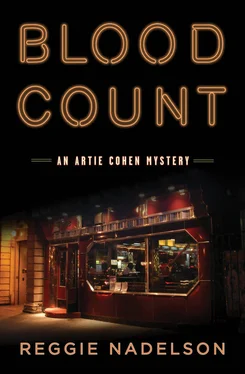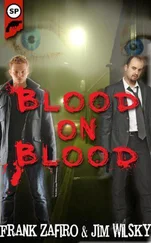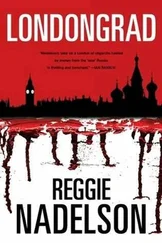Reggie Nadelson - Blood Count
Здесь есть возможность читать онлайн «Reggie Nadelson - Blood Count» весь текст электронной книги совершенно бесплатно (целиком полную версию без сокращений). В некоторых случаях можно слушать аудио, скачать через торрент в формате fb2 и присутствует краткое содержание. Жанр: Триллер, на английском языке. Описание произведения, (предисловие) а так же отзывы посетителей доступны на портале библиотеки ЛибКат.
- Название:Blood Count
- Автор:
- Жанр:
- Год:неизвестен
- ISBN:нет данных
- Рейтинг книги:5 / 5. Голосов: 1
-
Избранное:Добавить в избранное
- Отзывы:
-
Ваша оценка:
- 100
- 1
- 2
- 3
- 4
- 5
Blood Count: краткое содержание, описание и аннотация
Предлагаем к чтению аннотацию, описание, краткое содержание или предисловие (зависит от того, что написал сам автор книги «Blood Count»). Если вы не нашли необходимую информацию о книге — напишите в комментариях, мы постараемся отыскать её.
Blood Count — читать онлайн бесплатно полную книгу (весь текст) целиком
Ниже представлен текст книги, разбитый по страницам. Система сохранения места последней прочитанной страницы, позволяет с удобством читать онлайн бесплатно книгу «Blood Count», без необходимости каждый раз заново искать на чём Вы остановились. Поставьте закладку, и сможете в любой момент перейти на страницу, на которой закончили чтение.
Интервал:
Закладка:
From Simonova’s terrace, I could see the whole of Manhattan. Long and narrow, only partly visible in the snow, it looked like a great transatlantic ship that had hit an iceberg and was starting to slip down into the dark, cold water.
Suddenly, I heard the sound of water and a voice cursing.
“Goddamn this son-of-a-bitch raggedy-ass geranium plant! Damn it.”
I looked over the low wall that separated Simonova’s terrace from the one next door.
The man on the other side, tea kettle in hand, unlit cigarette in his mouth, was pouring steaming water into flower pots. He put the kettle down on a little table next to a coffee mug and turned to me.
“Hello there, sorry to bother you with my carry-on over here.” He had a deep, polished voice. “But it’s these damn plants just froze up on me. You don’t have a light, do you?”
I got the matches out of my pocket, gave them to him, he lit up, took a deep drag with a look of relief and deep satisfaction.
“Thanks.”
He was at least eighty, I guessed, but tall and lean with a full head of white hair. A purple birthmark stained his left cheek. His skin was medium brown, like milk chocolate, he had a thin mustache like old-time musicians often sported-he reminded me of Billy Eckstine-and he wore a good tweed jacket, a blue shirt, red sweater, gray flannels. On his feet were embroidered velvet slippers. He was a dapper guy.
“My wife doesn’t let me smoke in the house,” he confided. “She takes away all the matches, says I can’t even smoke out here, it gets in her drapes when the terrace door is open, but I sneak one now and again,” he said. “She says it will kill me. I tell her it’s my one remaining pleasure. I don’t mind about dying, only about pain. I usually go up on the roof to smoke, but it was iced over bad this morning.” He let out a long curl of smoke with a satisfied sigh. “How do you do? I’m Lionel Hutchison. Are you a friend of Marianna’s?”
I introduced myself. I said I was a friend of Lily’s, that I was visiting and she had asked me to look at a leak in Simonova’s ceiling. The lies came easy; they almost always do.
“Oh, dear, yes, well, it’s an old building, leaks like a bastard in bad weather. It’s even older than I am, but it’s sound, you know. There’s just a lot of foolishness about fancifying it. They rip stuff up, they run out of money, nothing gets finished, you know? You get used to it, though, or maybe I’ve just been here too long. I was only ten years old when we came here.”
He was clearly enjoying both his smoke and his own words. Glad for company, too, I thought. Not surprised to see me or hear I was a friend of Lily’s.
“When we came here, I was just five years old. My mother wanted to live there.” He pointed to the roof of the building next door. It was maybe ten feet below us. “Number 409 Edgecombe. Everybody lived there: Mr. Supreme Court Justice Thurgood Marshall, Mr. W. E. B. Du Bois, the Duke-lived in a seven-room apartment done up all in white. When it came to building the Armstrong-they didn’t call it that until later-ours had to be just a little taller, a little grander. Built by the same brothers back in the day, built for white folk, and those two brothers, architects both of them, they went at it, raising the ante, each of them, one putting on more fancy touches than the other.” He took another puff, holding the cigarette between his thumb and forefinger like old guys sometimes do. He chuckled. “Still, we never did have anyone throw a prostitute out our building, you know, not like over there-it did happen, yes, from the roof, I believe, or out the window, over at 409. We don’t let them forget about it. You cold?” He picked up his coffee and sipped at it.
“It’s pretty cold,” I said.
“I love the winter, the snow, the cold. Always seems to me to clean up everything in the city.”
“You’re a friend of Mrs. Simonova?”
“Good friends,” he said, but he didn’t ask how she was and I got the feeling he already knew. Cigarette in hand, Hutchison leaned his elbows on the wall between us, and settled in for some more talk.
“You interested in history? I like to think I’m a kind of local historian. This building, see, we had the nine-room apartments right from the beginning, with electric refrigeration, lovely wooden floors, high ceilings, terraces. You know about this part of town we call Sugar Hill? Everything that was sweet and expensive, so they said, and it ran right up here from 145th Street. See that building?” He pointed at Edgecombe Avenue. “Billie Holiday lived over there. We had musicians and athletes. The Polo Grounds, you heard of the Giants? Greatest baseball club of all time. They let us play there as kids. I was a boy, I played stickball with Sidney Poitier and Harry Belafonte in the street, I was here when Joe Louis beat Max Schmeling and when Ray Robinson took the crown. All of Harlem just walked down to 125th Street to celebrate. You have to picture it, thousands of people, all dressed up in the best they had walking together. I used to hang out at Ray Robinson’s club, later on.” He looked at me. “Sorry, I got to catch myself when I start rambling,” he said. “It’s the curse of the old, and in this building, we’re almost all of us old now. We feed off our memories, you see.” He smoked his cigarette, the end of it glowing hot and red, then tossed the butt into an empty pail. He seemed oblivious to the cold and snow. “One young man comes along, wants to buy my apartment. He says to me, ‘Dr. Hutchison, the myth lingers on here in Sugar Hill, like smoke, or sweet perfume; I want to be part of it,’ he says, a nice young Negro fellow, excuse me, African American, lawyer, very polite, and I have to bite my lip to keep from laughing because this young man, with all his expensive clothes, is about as sweet as a cheap cigar.”
I laughed.
“Right? It’s just so much, how shall I put it delicately, horseshit,” said Dr. Hutchison. “Did you know this here, this little hilly area, this is Coogan’s Bluff? Same as the film by that name with Mr. Clint Eastwood?”
“What about Armstrong?” I said. “Did he ever live in the building?”
“You a fan of jazz music?”
“Yes.”
“For a short time, yes, I believe he did, just for a few months, but it was before we moved in. I knew his Lucille. I knew her well enough they invited us to the house in Corona over in Queens for Thanksgiving once.”
I was hanging on Dr. Hutchison’s story. Armstrong is one of my heroes.
“Louis used to hand out Swiss Kris laxative to everyone, he had a deal to represent it. He was a kind man, and he was a genius, but he was sometimes sad. Sometimes you’d catch him looking out a window, a cigarette in his hand, and a faraway look on his face. You could hear it when he played sometimes. Most of the time, he just wanted everybody happy,” Hutchison said.
I thought about the house in Queens where Armstrong finally settled. It’s a little museum now where everything-the dishes, the furniture, Louis’s horn-remains just as it was when he shared it with Lucille.
For some reason, seeing it, the modest house in Corona where he had been happy, made me want to cry. All the musicians I love are long gone. I still have the music, though.
Hutchison looked over at me. “Marianna’s doing all right? Do you want to tell her I’ll come by a little later?”
“Sure,” I said.
“It’s the pain that’s the problem, of course. So unnecessary, so inhuman. Suffering, they say it’s good for you, tests your character. Such foolishness, but it’s as if some kind of fake stoicism has become our religion. Brave, they call it, when somebody’s terminal, but what choice do they have? Being brave is about choice. Pain leaves you no choice,” Dr. Hutchison said angrily.
Читать дальшеИнтервал:
Закладка:
Похожие книги на «Blood Count»
Представляем Вашему вниманию похожие книги на «Blood Count» списком для выбора. Мы отобрали схожую по названию и смыслу литературу в надежде предоставить читателям больше вариантов отыскать новые, интересные, ещё непрочитанные произведения.
Обсуждение, отзывы о книге «Blood Count» и просто собственные мнения читателей. Оставьте ваши комментарии, напишите, что Вы думаете о произведении, его смысле или главных героях. Укажите что конкретно понравилось, а что нет, и почему Вы так считаете.












